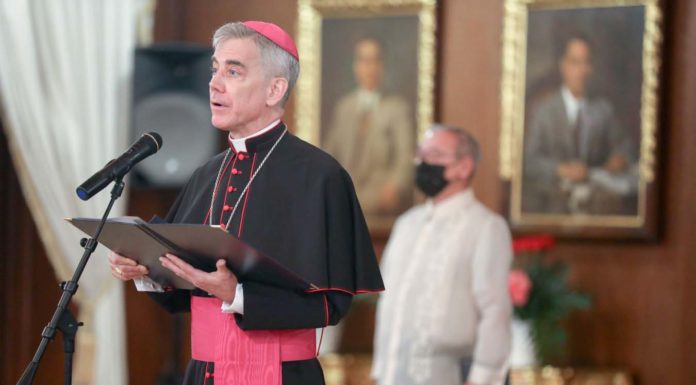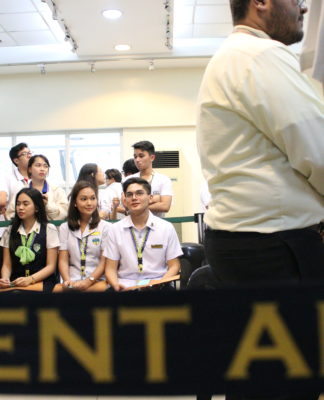POLITICS, old, corrupting politics, has affected the UAAP. And it comes in the face of the new, the face of the so-called young turks of politics. Which should show that in the Philippines, there’s no distinction between old and new politics, between old and new politicians; in the first place, politicians belong to the same dynasties: old or new politicians, they’re there to uphold their self-interest.
Much has been said, too much drama has been shown with regard to the controversy involving University of the Philippines (UP) freshman Anna Dominique Bartolome, a star swimmer from UST High School, and the UAAP residency rules.
It started from a complaint and ended with four UAAP schools boycotting the women’s swimming competition.
Bartolome was barred from playing for UP this year due to UAAP’s two-year residency rule. It bars a student from a UAAP university’s high school, who transfers to another UAAP university for college, from competing for two years without first being granted a release from the first university, in this case UST.
In turn, Bartolome’s father, with the gratuitous assistance of Sen. Pia Cayetano, a former athlete herself in UP, filed a complaint against UAAP and UST.
But the judge, probably aware of the enormous political shadow cast by the feisty senator, issued a temporary restraining order (TRO) against the two-year residency rule of the UAAP.
The contested rule, which was originally for only one year, was intended to discourage aggressive recruiting of athletes, especially by schools that have more than scholarships to offer. It was recently lengthened to two years as UAAP’s response to former FEU juniors back-to-back MVP Jerie Pingoy’s transfer to Ateneo.
It may be significant to note that following a Senate inquiry, UAAP added a “release clause” that allows transferees to play immediately for his new school if they can secure a release from their former schools. (The clause itself was of course made due to meddling by lawmakers who were better off spending taxpayer money on matters far more important than intramural sports.)
UST was correct in not granting Bartolome’s release: it should rightly adhere to the rules set by UAAP. The University’s legal counsel, Nilo Divina, said UST could not issue the release document, because it would “open the floodgates to similar requests, thereby circumventing the rationale of the rule.”
Nor was there anything wrong with Bartolome and her father’s search for relief with the courts. They had every right to contest the UAAP rule, which they believe was unfair and oppressive. Bartolome wanted to study in UP. Her sister had also been part of the swimming team there.
But Senator Cayetano, in true "trapo" fashion, jumped at the opportunity like the matter could not be resolved without her almighty presence. Or perhaps, she just couldn’t resist acting according to her nature—her nature as a TRAPO.
The senator said she only wanted to help, but the only help she gave was to sensationalize the issue and put pressure on the judiciary and compel it to act against the UAAP. In fact, she even publicly admonished UAAP through Twitter, her favorite pastime other than bashing the Catholic Church and promoting political dynasty.
As observed by Divina, who’s also the dean of the Faculty of Civil Law, the wide publicity generated by the intervention of Cayetano might have influenced the court in issuing the TRO against UST and the UAAP.
Does the fact that she was a former athlete of UP justify her meddling? We think not. To be sure, the fact that she’s a senator, a high elective official, should at least restrain her from delving into issues that are outside the pale of legislative concerns.
Come to think of it, what have the UAAP residency rules got to do with legislation? Lawmakers are supposed to conduct inquiries “in aid of legislation.” Obviously she lost all sense of delicadeza when she meddled in an issue that was clearly not in aid of legislation. At the least, senatorial comportment requires her not to as much make a comment on such an issue because to do so would be tantamount to unseemly partisanship and conflict of interest.
She should instead give more attention to the Senate, which is at present at the center of worsening controversy over pork barrel and horse-trading as a result of revelations that President Aquino, her coalition mate, had used the pork barrel in order to compel lawmakers into impeaching and convicting former chief justice Renato Corona and passing the reprehensible Reproductive Health bill. Oh, did we mention that she was one of the lightning rods of the administration on those two issues?
Instead of sticking her nose on varsity sports, why doesn’t Senator Cayetano author a bill to finally enable the constitutional ban on political dynasties, the absence of which since 1987 has allowed political dynasties like the Aquinos of Tarlac and the Cayetanos of Taguig to luxuriate in and overpopulate high governments?
Varsity sports a privilege
The senator apparently gives the presumption that being a student athlete is a right. It is not; it’s a privilege since in the context of the broader aims of education, being an athlete is just one channel to develop the fuller person. And the fuller person is a person of character and integrity, a person who plays by the rules. Being an athlete in an educational setting carries with it certain conditions. And in this case, one condition set by UAAP is the residency requirement.
The University and UAAP did not bar Bartolome from studying in a school she desires, because that is her right. However, playing for that school’s team is a privilege, just as when she was playing for the high school varsity team was also a privilege; thus, as in middle school varsity sports, she is bound by the rules set by the UAAP in college varsity sports, even if she, her father, and a senator with an excess of hubris think otherwise.
In the end, Bartolome was able to compete for UP. Yet she’s still the loser in the battle outside the swimming pool, because, in the eyes of the universities, she and other athletes under UAAP are treated as mere prizes to pirate and collect. A proof of that is four UAAP schools boycotted the UAAP women’s swimming competition.
In the first place, the residency rule does not stop the student from playing her sport. Bartolome could as well become a member of the UP varsity team after the residency period. If she and her family and UP had bothered to play fair, then she could just sit out the two years and join the team later.
But it’s not athletics and sportsmanship that matter here. It’s not fairness and integrity that are supposed to be cultivated by education that are the important considerations here. It’s the self-interest of Bartolome and her family and a senator who couldn’t resist playing cheerleader to her old school—and getting free publicity in the process.


















